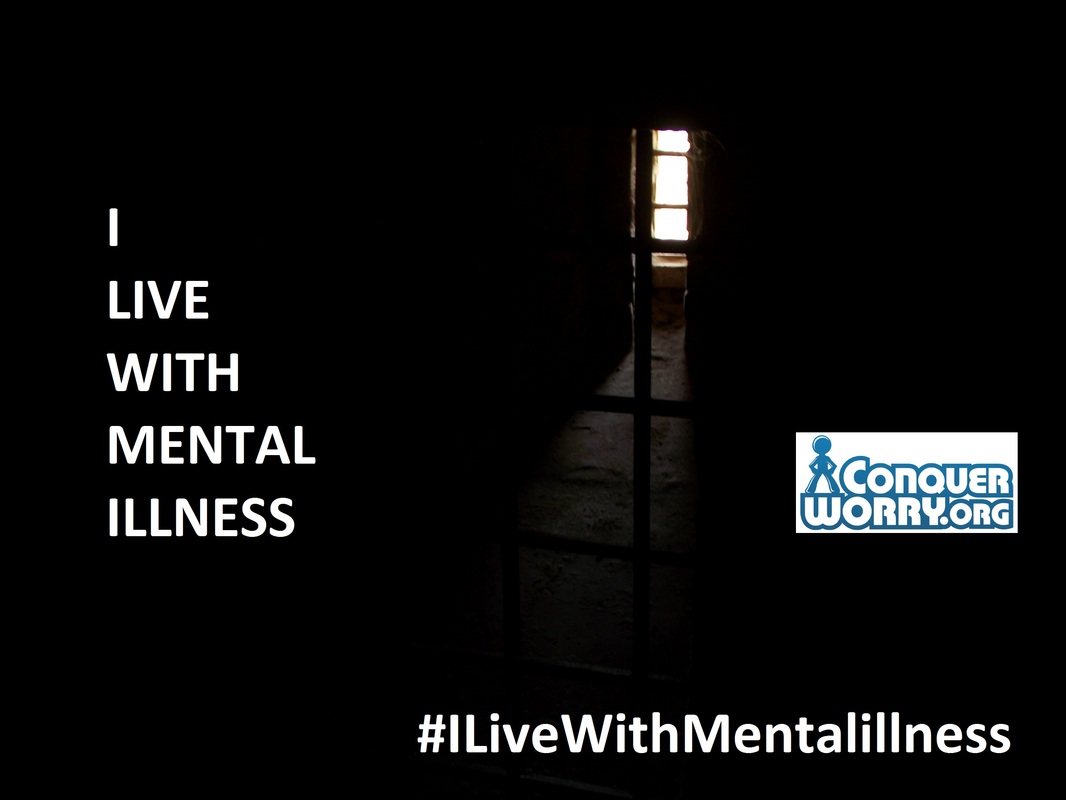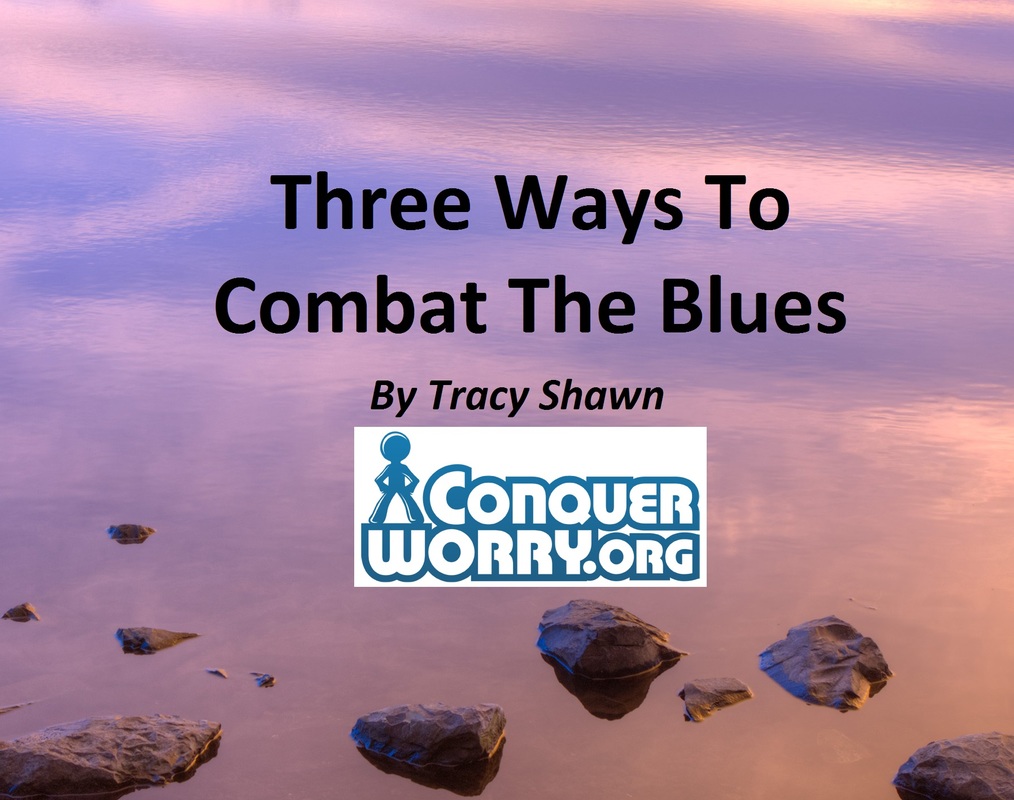
Jay Coulter is a Mental Health Speaker & Advocate. His team founded the mental health advocacy platform Conquer Worry. Their mission is to create awareness of the resources that are available to those who struggle with mental health. In addition to a Podcast - The Conquer Worry Show, they have quickly built a large audience with over 100,000 social media followers:
Twitter | Facebook | Instagram | Pinterest
0 Comments

My name is Tom, I'm 45 yrs old
After Not eating for days On February 15, 2012 I Bought a liter of Vodka Grabbed every lethal dose of pills I could find Turned my iPhone to airplane mode so I wouldn't be found Drove to my Brother’s grave at Floral Hills it was night time and raining I found his grave and looked down and said Hopefully I will see you soon I laid down and I took all the pills and drank all the vodka 
Somehow I was found lifeless and I had slipped into a coma
My family was told I would probably be in a coma for weeks Three days later I started waking up Now I take day by day and sometimes hour by hour Depression and Anxiety are a daily struggle for me I pour out my feelings onto paper with my art Here is a link to my art and I tell a story with every post Connect With Tom Facebook: www.facebook.com/KCWarthogArt Website: www.paintingsilove.com/artist/kcwarthog 
(This article was first published in Psychcentral.com)
Often, stress, disappointments, and mundane realities of everyday life plague our inner worlds so much that it’s difficult to experience positive emotions such as joy, peace, and spontaneity. Unfortunately, it becomes a vicious cycle. The negative emotions build up even more, sapping our mental and physical energies to the point where it’s a challenge just to get through our daily routines. Our bodies become just as blunted as our spirits. Happily, though, there are three easy and inspiring activities that can help us beat the blues and increase our general well-being. View art. Professor Semir Zeki, a neurobiologist at the University College London, conducted a series of experiments about what happens to the pleasure centers of the brain when people view works of art. After scanning volunteers’ brains while they gazed at a variety of masterpieces, Prof. Zeki noted that there was a definite increase of activity in the pleasure reward centers of the brain.According to science correspondent Richard Alleyne’s May 2011 article in Telegraph.co.uk, viewing art “…triggers a surge of the feel-good chemical, dopamine, into the orbito-frontal cortex of the brain, resulting in feelings of intense pleasure.” Alleyne, who had quoted Prof. Zeki on his studies, also stated that this current research suggests that viewing art can increase general mental health. Listen to music. There are countless references from centuries past about how music mends our souls. Now science has proven these sentiments to be true. Research conducted at the University of Missouri found that listening to music does lead to more positive feelings. Yuna Ferguson, the study’s lead author, states that participants markedly improved their moods after listening to upbeat music. In a June 2013 Psychology Today article, pharmacist Catherine Ulbricht states that all forms of music may have therapeutic effects. “There is strong scientific evidence supporting the use of music therapy for mood enhancement and anxiety/stress relief, according to Natural Standard research,” Ulbricht said. Hit the dance floor. Exercise is an overall feel-good remedy. The benefits of physical activity include the reduction of stress, depression, and anxiety. Combine exercise with mood-enhancement music and the brain-stimulating steps of dances such as salsa, merengue, and swing, and you’ve got an uplifting activity. According to Jeannette Thornton, M.D., dancing “…releases pleasurable brain chemicals that fight against depression and help build self-confidence and improves self-esteem.” Also, dancing can be a lot more fun and socially engaging than other forms of exercise, which encourages the joy of spontaneity and decreases feelings of isolation and depression. Yes, when you are feeling anxious, depressed, or stressed, it can be challenging to not only make the time, but also gather up enough energy to engage in art, music, and dance. Yet it can be done. And in so doing, you may be rewarded with a surprisingly wonderful boost to your emotional health. So next time you’re down, take a peaceful stroll through a museum or gaze at the pages of an art book to boost the feel-good chemicals in your brain. For another healthy and positive mood-enhancement activity, go to a concert or simply crank up your favorite music while driving or cleaning house. And to help release even more of your pleasurable brain chemicals, boogie on down to the dance floor. In fact, why not reward yourself with a whole “mental-health” Saturday to take in some art, listen to your favorite music, and then swing dance your way out of the blues? By Sunday morning, you may be that much happier for it. Tracy Shawn 
Author Tracy Shawn enjoys visiting local book clubs and is also available to Skype as a guest author at one of your book club gatherings. Please feel free to contact her on her website: http://www.tracyshawn.com/contact-t-shawn/
Tracy Shawn lives and writes on the Central Coast of California. Her award-winning debut novel, The Grace of Crows, is about how an anxiety-ridden woman finds happiness through the most unexpected of ways—and characters. Hailed as a deeply moving heroine’s journey and a story that lingers in the mind long after the finish, The Grace of Crows has also been regarded as a powerful fictional read, which paints an accurate portrayal of generalized anxiety disorder and a healing opportunity to the reader. 
Let me start with a quote- "Do or do not, there is no try." Was this a famous saying of some great philosopher? Nope. Not even close. The quote is from Yoda. Yes, the Star Wars character. Taking life advice from a fictional character is not always the best way to go. That said, can you believe I was in a group therapy setting where the moderator taught this as a principle of life to be followed? Well it was. And for me it triggered despair. You see I have illness that can make me prone to all or nothing thinking. That if you aren't guaranteed success, why bother. Hearing this moderator made me even more prone to not even try at things. Despair is a harsh combination of feeling/being helpless and hopeless. And I believe that only doing or not doing with no such thing as try is a despair maker.
I want us to know that not everyone believes that there is no try. In fact, trying can be a very good thing. Webster defines try like this- 1) to make an effort to do something, to attempt to accomplish or complete something. 2) to do or use something in order to see if it works or will be successful. 3) to do or use something in order to find out if you like it. To try using these definitions is to be smart. For instance, free trials of products can save us from paying for and continuing with things that are harmful or useless. A song I love contains this lyric- "If I limp then I will run with a limp, I'll win some and lose some but I'll make my attempt." Often to try is an act of courage. An act of conceding you don't know everything and proceeding until you can truly see if it's a good idea or bad one. By not trying many locked doors will stay locked. I dare us to at least knock on those locked doors and see what happens. Lastly, I believe there is one form of try that can be unhelpful and even harmful. It is when we know we have the capability to succeed at something but you're content to not put your best effort in. To be happy with mediocre. This form of "try" is no try at all. In closing, this writing wouldn't exist if I was not willing to try. This came together as I worked on it. Started with that Yoda quote in my head. And now, I have benefitted by completing this. I hope it may encourage a reader or two along the way. I leave you with the following words to ponder- “It's not about success life is not a test, you don't pass or fail you just do your best See the view from wings of courage, to push on through when we're discouraged It's all about the try, all about the ride Learning how you were meant to touch the sky Failures are fliers who touch down, only they know what it's like to leave the ground”
“I’m going to say something now and you’ll think I’m terrible: I hate being a stay-at-home mom”.
This lovely woman’s words inspired this Mother’s Day post. It’s not the first time either of us have heard these – or similar – words spoken. They are always said in a cloud of shame, fear, a quiet desperation. It takes courage to say this out loud to another human being. There is risk involved after all. The risk? Judgement. A fear, to use her own words, that she’d be judged “terrible”. A fear that she might be seen as a ‘bad’ parent, an ‘abnormal’ mother. Because this is how mothers often judge themselves, and each other. These words often remain in a woman’s head for years, festering along with feelings of guilt, shame, loneliness and fear. Fear that not loving parenting must somehow mean not really loving her children. Does any of this feel familiar? Where do these feelings come from?We’re not really ‘allowed’ to hate parenting are we? Most mothers never hear anyone else saying what therapists are privileged to hear in the safe quiet space of therapy. Even women who have close friends who are mothers too. Even moms who have good moms themselves. Feeling unfulfilled in the job of full-time (or also part-time) mother seems to be one of our society’s last remaining taboos. We are not saying that every stay-at-home mother hates being a mother. We are saying that most mothers have times where they hate mothering, and some mothers struggle with it most of the time. Sometimes being a mother sucks. It just does. It often seems that women are expected to ‘take to motherhood’, to have the maternal instinct ‘kick in’, to hear the biological clock clang, to know instinctively how to rear children. And – here’s the kicker – to enjoy letting go of life as we knew it to rear those children. Women are socialized from childhood to understand that all of this childbearing and rearing business is at the core of being feminine, being attractive, beingworthy. More women than men are depicted as the primary and ‘responsible’ parent in childrens’ books, stories, advertising. As we age we see it continue in magazines, parenting websites, the list goes on. As adults, childless (you may prefer child-free) women are often either pitied or frowned upon. So, it’s understandable then that it can destroy a woman’s self-esteem to discover that she doesn’t enjoy being a full time parent, or even a part time parent. Because suddenly (maybe gradually) she feels pain instead of the promised / assumed fulfillment. It’s quite a let down. A bitter pill to those expecting sugary loved up bundles of cute fluffiness. And there’s no going back. The simple truth is that not every woman enjoys full-time mothering. And it can be experienced as quite traumatic when that realisation hits. Staying at home to care for children full-time is a significant change of lifestyle for more women now than ever before. For some, it is because they have already started or established a career before deciding to have children. Staying at home full-time is a choice influenced by many factors – what your own mother did (or didn’t do), some popular parenting mentors, employment status, and even peer pressure (it’s what your friends have chosen!). Modern motherhood and womanhood is the focus of much research. Some women feel it’s better for the child or children to be reared by their mother in the home. Some women make that choice because they believe their partner’s career is more important than theirs. Maybe their partner simply makes more money and has better health benefits. Some women still believe that men are incapable of being primary care-givers. The reasons are endless, some valid, some not. Whatever the reason behind the choice, it is vital that mothers learn to place a greater value on themselves and on their work as a full-time parent. Because it iswork! This includes acknowledging and valuing feelings of loss or rage or anger or boredom – all normal feelings after making any type of major lifestyle change. It is crucial to know that loving one’s children does not necessarily mean that you will love parenting them. So while full-time parenting is rewarding and joyful for some women, it feels like loss for others. What types of loss are commonly associated with full-time mothering? * Loss of a feeling of being an individual, of one’s identity * Loss of status in the workplace. * Loss of earnings * Loss of contact with adults and the vital stimulation that that offers * Loss of energy * Loss of sex drive, intimacy and time to connect with, or even find a partner. * Loss of support, laughter, feedback, recognition and acknowledgement. The feelings of loss can be like a slow-burning fire, one that might be only barely noticeable but gradually, over time, some women start feeling depressed or anxious and are not quite sure why… There may be no conscious awareness of what has been lost, the basic needs that are no longer being met (see our last post for how to deal with that!). Many mothers who don’t enjoy mothering, be it periodically or most of the time, have niggling thoughts lurking in the back of their minds. They go something like this: “Am I a good enough mother? ( click on that to help you figure that out ;)) What’s wrong with me? I’m so weird! I must have a hormonal imbalance. I’m not a real woman. Some women can’t have children! I should be grateful. My mother managed fine, my friend manages fine, everyone in the whole entire world is coping except me.” (Newsflash: they’re not.) What can you do if you – or someone you know – feels this way?* Firstly, avoid the temptation to rush in with the labels “depression” or “post-natal depression”. Despite how miserable she sounds, a woman who speaks like this is not necessarily clinically depressed. In fact, she is reacting normally to what is, for her, an abnormal situation. A skilled therapist or psychologist will know the difference between these normal struggle and clinical depression. If you remain concerned after reading this, we suggest you source someone nearby for extra support. * Share how you feel with someone. This could be a friend or even a stranger online. Discover how other people feel. It’s always a relief to know that you’re not ‘the only one’ isn’t it? So read through or add to comment threads on social media (or here!). Find a way to get it out of your head. Maybe even find somehumor in your darker hours. (Click for a song that might make you giggle). * Figure out what you’ve lost and how best to meet your needs while being a mom. This piece might help. Finding ways to meet your needs is a sign of good mental health, and of good parenting. * Remember that nothing is permanent. Kids have this habit of growing up. * Stop judging and telling yourself that you need to pretend. We all need support, we all need to know that we are normal. And we can’t have that if we all continue to trot around pretending everything is always fine because that’s just not being human. And we are all human! And finally – on this Mothers Day – if nothing else – celebrate making it through another day with (most of) your mental health intact! You’ve got this… And we’ve got your back! |
Build Your Action Based Stress Reduction System
Popular PodcastsOlympian Suzy Favor Hamilton - From Fame to Prostitution to Advocacy
Hall of Fame Basketball Star Chamique Holdsclaw on Mental Resilience Diana Nightingale on her husband Earl Nightingale's Principles for Mental Health Success JoAnn Buttaro on Date Rape & PTSD Survival Story: Its Never Too Late Gabe Howard on BiPolar Advocacy Phil Fulmer on Teen Suicide Prison, Bipolar and Mania with Andy Behrman Columbia Univeristy's Dr. Rynn on OCD Archives
March 2018
Categories
All
|




 RSS Feed
RSS Feed





